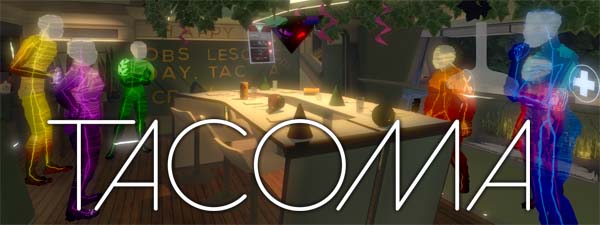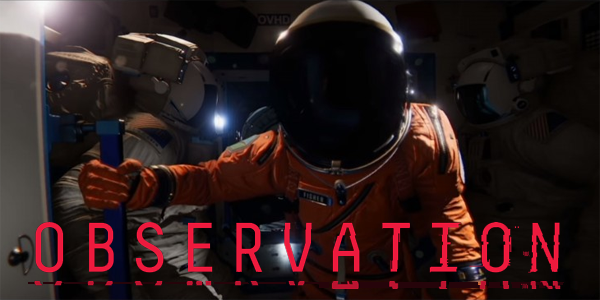
Here's another short sci-fi game from my Steam backlog. Tacoma is Fullbright's sci-fi follow up to its masterful walking sim Gone Home. This time around, instead of playing as a young girl discovering the secrets of your family, you play as an agent of a corporate conglomerate sent to retrieve the company's A.I. hard drive from a defunct space station in which an emergency threatened to kill the entire crew. Instead of reading notes and journal entries, you instead replay holographic representations of logs that the station's onboard A.I. recorded of conversations between the station's crew members.
You have to eavesdrop on recorded conversations as holograms move around the station.
The whole process is much more active and player-driven than the exposition of Gone Home (and other walking sims) because the holographic recordings of the characters move around the stations and converse in real time. You don't just walk into a room and read a conspicuously-placed note or listen to passive narration. You'll have to follow the characters between rooms, and keep track of multiple conversations at once as the characters come and go, and as they split up from large group meetings and start to have smaller, more private conversations. Each recording will usually have 2 or 3 independent conversation threads for you to follow. As you follow each character around, you'll also be spying on their personal text messages and emails.
This gives a greater sense of participation from the player (compared to many other walking sims) and provides a greater illusion that you are solving a mystery. That being said, there's nothing too challenging about finding and listening to all the possible conversations. They aren't elaborate puzzles that will take time to figure out. You just follow each character around the space and listen to them. It keeps the player interacting with the game space without ever applying a high bar for progress.
Don't expect to be stumped by the puzzles.
Without spoiling too much, there is only one ending, and you aren't going to be punished for not uncovering all the available evidence. The worst aspect of the game's "walkign sim" nature is that you're also never asked to apply any of the knowledge that you acquire from your investigations other than a handful of numeric combination codes for unlocking doors and the like. These codes are basically just progress gates to provide the illusion that the game has "puzzles", but the early exposure to these key codes will further encourage the player to snoop around more thoroughly for potential clues to future puzzles or progress gates. It isn't very intellectually challenging, but it does encourage the player to pay more attention.
[More]
ad0da423-9efe-41a3-b0fc-37ab8db4fe16|0|.0
Tags:Tacoma, Fullbright, science fiction, walking simulator, artificial intelligence, corporate culture, stock market, Amazon, Tyson Foods, COVID-19, pandemic
![Event [0] - title](/image.axd/2021/3/Event0-title-600x250.jpg)
Continuing on through my years-old backlog of indie Steam games, I moved away from Bloober Team games, but stuck with the sci-fi genre and played one of the most innovative games from 2016. I may be five years late to this one, but Event [0] is still a unique sci-fi mystery game that no other developers seem to have tried to emulate. As such, the game still holds up quite well.
The central premise here is that you find yourself in an abandoned space station in orbit around Jupiter. Your only companion is an onboard A.I. named Kaizen who talks to you through text on computer terminals scattered throughout the small station. The gimmick here is that all your interactions with Kaizen are handled by typing questions or commands into the computer terminals using your keyboard. The game uses some natural speech recognition algorithms to parse your text, interpret its meaning, and compose an appropriate response for Kaizen. It's like installing CleverBot into your game as an NPC.
The only other character is the possibly-malfunctioning onboard A.I., who you can type questions or commands to.
Even 5 years later, it's still a wholly unique way of interacting with an in-game NPC, and Kaizen comes off as being fairly believable. It certainly helps that the developers decided to make Kaizen an A.I. character instead of a human NPC, since it makes your interactions with Kaizen feel a bit more natural and believable. And when Kaizen gives a nonsensical response, it's easy to chalk it up to it being a malfunctioning A.I..
You are expected to explore the space station, investigating the environment for clues, and asking Kaizen questions to help you unravel the mystery of what happened to the crew of the station. The station only has a handful of rooms, and only had [I think] 3 crew members on it, so it doesn't take long to figure out what happened. In fact, the whole game is playable within about 2 or 3 hours, and repeat play throughs (to get alternate endings or whatever) can be completed in an hour or less. [More]
Last year, I put up a poll asking my Patrons what topic they would like me to discuss in a video critique for the 2020 series of independent football video games. At the time, I only had a handful of Patrons, and the winning topic (which won by a single vote) was to discuss the "football knowledge" of Axis Football 2020 and Maximum Football 2020. At first, I wasn't sure if there would be enough for me to talk about, but I ended up having plenty of criticism. I broke the critique up into three broad topics, which were further divided up into sub topics. Each major topic received a video, and altogether they added up to over two hours -- the length of a feature film!
At the time that this is posted, only my Patrons had been given the link to the third video in the series. I'm posting this blog a few days before the final video is scheduled to go public on YouTube, so that my loyal blog readers can also have early access to the new content. There is also a new poll available on my Patreon page asking which topic(s) I should cover for the fall 2021 indie football game season.
I'm not going to reproduce a transcript of the entire video series in writing here, but I will summarize each, with each video embedded in the corresponding section.
First, I want to point out that the criticisms in these videos may seem harsh. These are small, independent studios with only a few developers and limited money and resources. I can't expect them to produce games with the polish and production quality of EA or 2k. But that being said, both games are trying to compete in the "simulation" football market. If we are going to take them seriously as simulation football games, then I believe that we should give these games the same level of scrutiny that we would give to a game published by EA or 2k. We can do so while still acknowledging that these games are coming from smaller studios, and we can set our expectations accordingly. I don't expect Axis or Canuck to address all of the issues that I point out overnight, but I still want to point them out in the hopes that they will be addressed in future iterations of the games.
Topic I: Play Design and Concepts As Old As Football
The first video topic was the design of play concepts in each game.
Axis Football and Maximum Football currently do not do a great job of replicating certain common play concepts. I started by demonstrating how neither game properly models timing routes, especially, short, quick routes that are common in west coast schemes. If you press the button to throw the ball to a receiver prior to the receiver completing his route, the quarterback in both games will throw the ball in the direction that the receiver is running (at the moment the button is pressed), instead of throwing to where the route is supposed to go. If, for example, the route was a curl, and you press the receiver's button just before the receiver turns around, the QB will throw the ball down the field as if the receiver is running a streak. This can often send the ball right to the waiting hook zone defender or safety, even though the play is explicitly designed to get the ball underneath those specific coverages.
The 1st topic is the design of timing routes and power running plays.
The second sub-topic in this first video was how each game implements power running plays, which have been a staple of football since its inception over a century ago. Maximum Football does not support pulling linemen, with the sole exception of one single play in the Canadian rulebooks. Even the play designer does not support the ability to add pulling linemen.
Axis Football does have pulling linemen, but they don't work quite right. Blocking schemes aren't designed to isolate or "trap" certain defensive players, which means that plays like Traps, Counters, and Power plays do not create the running seams that they are designed to create. [More]
7ea666de-e0eb-4ef1-b40f-52e489909973|0|.0
Tags:Maximum Football, Canuck Play, Doug Flutie's Maximum Football 2020, Axis Football, Axis Games, Axis Football 2020, artificial intelligence, strategy, football, indie gaming, YouTube, Patreon

It's real refreshing to come across a science fiction game that isn't just about shooting aliens with laser guns or blowing up space ships. If you're in the market for a thoughtful, well-presented science fiction experience, then I highly recommend that you check out Observation. If you're also into horror, then even better, because this game definitely has some horror elements as well. They're much more subdued, but this game does do a fantastic job of creating a building sense of tension and intrigue as its over-arching mystery is slowly unfurled.
The gimmick here is that you play as a malfunctioning artificial intelligence on a near-future orbital research station. The game is presented as a sort-of found-footage narrative (think along the lines of the Apollo 18 horror movie) told entirely from the point of view of the on-board A.I. Something goes wrong, the crew are all missing and possibly dead, and you help the sole survivor try to find the remaining crew and piece together what happened to the station. Think along the lines of playing as the HAL 9000 from 2001: A Space Odyssey, or as Kevin Spacey's character in the [fantastic] movie Moon. You do this by jumping between different surveillance cameras (a la Five Nights at Freddy's, but, you know, with ambitions of being more than just a random jump-scare-generator). Through the cameras, you interact with various technology and station systems within your line of sight. You'll occasionally be asked questions or given commands by the surviving astronaut, and you chose how to respond.
You are an unreliable A.I.?
From the start, there's a certain degree of unreliable narrator going on. One of the very first actions that the game asks you to do is verify the identify of the surviving astronaut via her voice print. You are initially told that her voice print does not match, and you're given the option to accept or reject her voice print. If you reject, she'll repeat her authorization code, and you'll be told that it matches this time. Is she not who she seems? Are your own systems providing you with misleading information? Are your systems merely damaged? This creates an immediate sense of distrust. You (the player) don't necessarily trust the survivor, the survivor doesn't necessarily trust you, and you can't even trust your own perception and judgement.
From the start, it's unclear whether you can trust Emma, or whether she can trust you...
This immediately creates a dense atmosphere of intrigue and mystery and sets a level of tension that persists through the entire game.
This atmosphere is helped by the richly-detailed near-future space station that you inhabit. The visuals are immaculately detailed, and the station looks and feels like it could be modeled after the real-life International Space Station. The spaces are tight and claustrophobic. Accessories and stationary are strapped or velcroed to the walls, floors, ceiling, and desk surfaces in order to prevent them from floating off in the zero-gravity environment. Everything is believable.
The game further builds its atmosphere with its immersive U.I.. Every button press, command, and interaction has some in-universe context behind it that helps to keep you in the mind-space of your A.I. character. The U.I. is mostly easy to use, and most actions feel intuitive.
This game hooked me in with its setting and atmosphere, and I just had to keep playing to find out what happened and where this would go!
The space station and U.I. are believable and immersive.
... [More]
409df8bf-36a0-4560-ac9f-e173dd9fc208|0|.0
Tags:Observation, No Code, Devolver Digital, PSN, Epic Games Store, science fiction, horror, mystery, point-and-click, walking simulator, puzzle, indie gaming, camera, found-footage, unreliable narrator, space, astronaut, artificial intelligence, HAL 9000, 2001: a Space Odyssey, Five Nights at Freddy's, Saturn

This one snuck up under the radar for me, and was a real pleasant surprise. Upgrade is a Blumhouse Productions film made by some of the same people who make Insidious, The Purge, and Saw, so the previews didn't really sell me on the idea of a clever sci-fi thriller. I was expecting more of just a gore-fest. There's some really over-the-top violence and gore, but the movie is paced well enough that every single graphic kill feels legitimately earned. The choreography is exceptional and creative, and might have been worth the ticket price alone, even if it weren't attached to such a well-made movie.
Where Upgrade surprised me, however, is the way that it is filled with small world-building details that really help to sell this idea of slightly-dystopian near-futurism, and the almost luddite level aversion that some people might have to the inevitable automation of our lives. It does this by being a small, simple story that has a sinister undertone, but which doesn't feel like it's trying to be too grandiose or overblown. This is basically a hard-R-rated feature-length episode of Black Mirror.
Upgrade has some very slick choreography, and some gruesome (but well-earned) violence.
The twist was, admittedly, very easy to see coming after about 10 minutes into the movie, and so the build-up to it makes the bulk of the movie feel kind of predictable. However, there was a second twist that did catch me off-guard. I'm not sure if the movie really builds up to that second twist properly, but maybe that's just me... [More]
|

| 12 | | | | | | | 60 | | 11 | | | | | | | 55 | | 10 | | | | | | | 50 | | 09 | | | | | | | 45 | | 08 | | | | | | | 40 | | 07 | | | | | | | 35 | | 06 | | | | | | | 30 | | 05 | | | | | | | 25 | | 04 | | | | | | | 20 | | 03 | | | | | | | 15 | | 02 | | | | | | | 10 | | 01 | | | | | | | 05 |
|